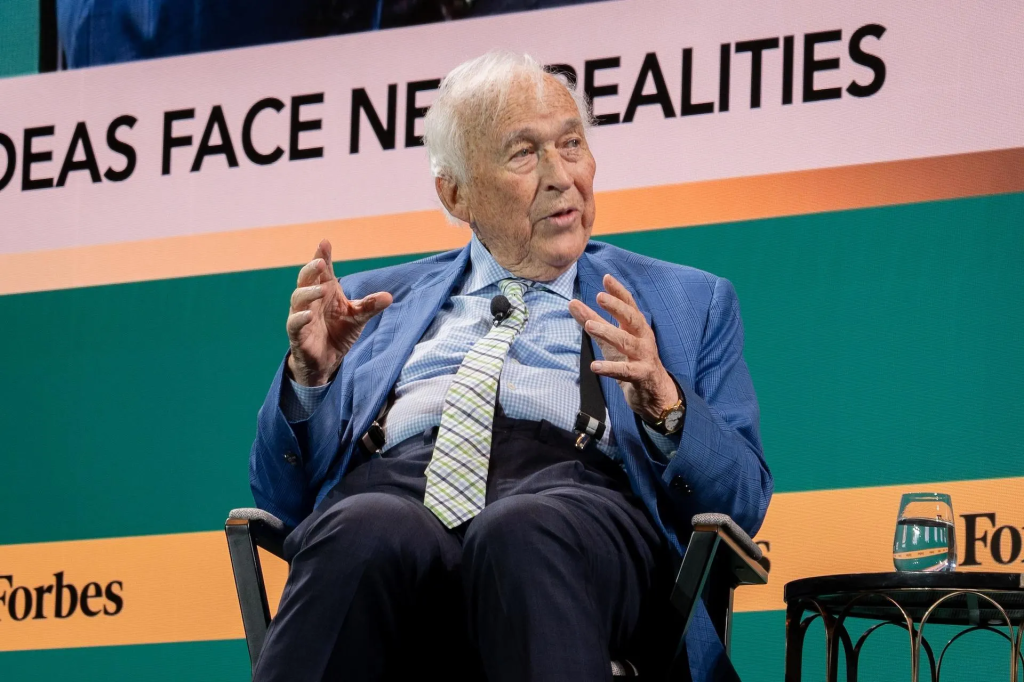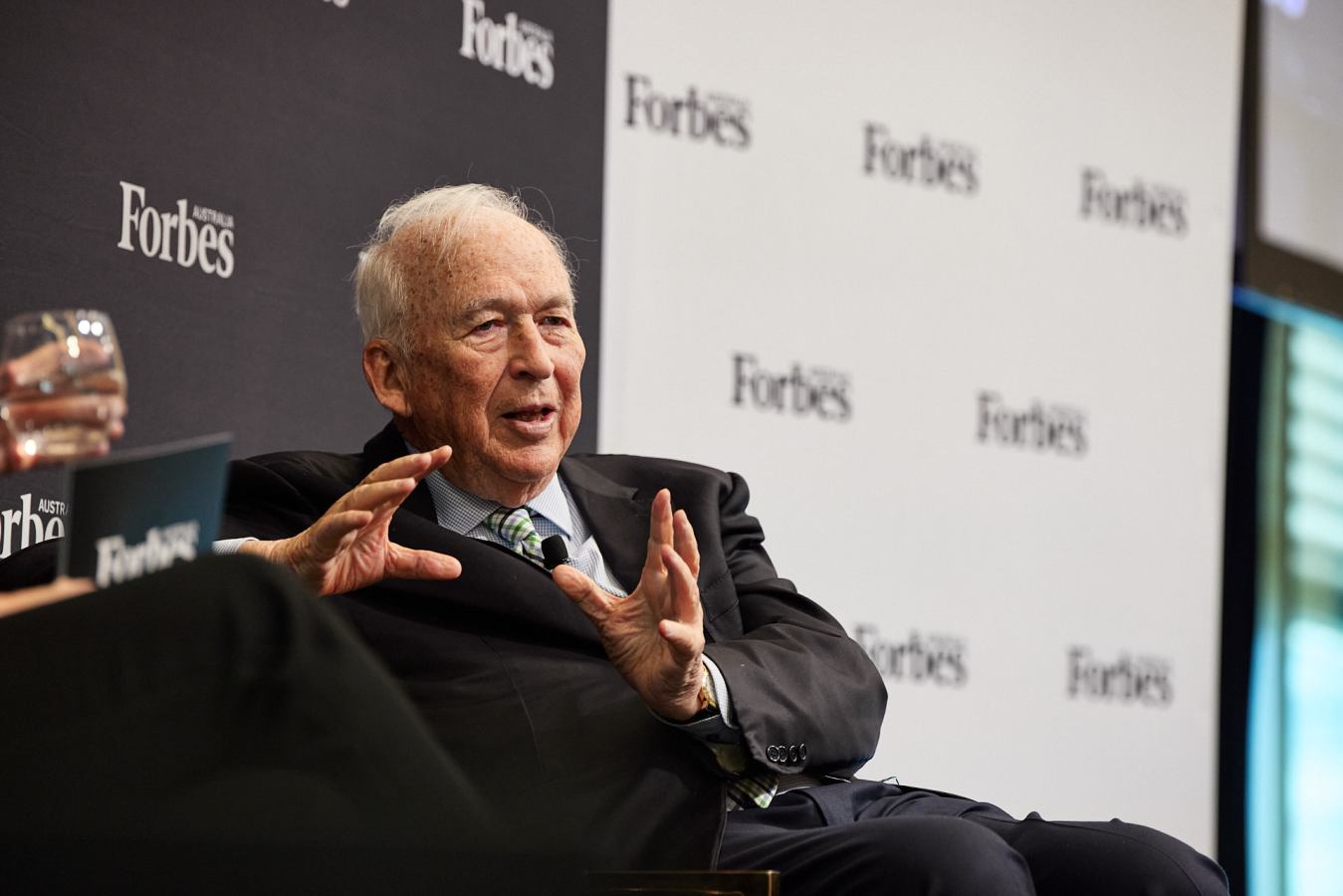Reinvestment is key, says Competitive Foods Australia’s founder and executive chairman, who sticks with the basics in “a people business.”

Despite the recent upheaval with Covid, the fundamentals haven’t changed in the fast-food industry in the past 50 years, says Jack Cowin, the billionaire founder and executive chairman of Competitive Foods Australia, the privately held group behind some of the country’s biggest fast-food chains.
“Food has got to be hot, drinks have got to be cold and the service has got to be with a smile,” adds Cowin, one of Australia’s richest men with an estimated net worth of $3.2 billion, speaking on the sidelines of the Forbes Global CEO Conference in Bangkok in November.
Hungry Jack’s, a Burger King franchise in Australia—the name Burger King had already been trademarked by a local restaurant—is one of the largest fast-food chains in Australia, by both store count and revenue, which Cowin grew from a single store in Perth to over 440 stores today.

A Hungry Jack’s outlet in Brisbane. The fast-food chain is owned by billionaire Jack Cowin’s Competitive Foods Australia.
ullstein bild via Getty Images
The chain has defied a trend that saw people, hit by higher costs of living, spending less on eating out. Australia’s fast-food and takeaway industry has grown at an annualized 1.3% over the past five years to hit an estimated $25.3 billion in 2024, per global market research firm IbisWorld. In the year ended June 30, Competitive Foods saw an 18% jump in revenue to A$2.4 billion from the previous year as net profit edged up to A$74.1 million, according to a filing with the market regulator.
Still, how the business is managed has changed, Cowin says. A shift to drive-through and takeaway alongside rising building costs and red tape has seen store size shrink by about 20% on average. “It’s a balancing act,” says Cowin, noting that costs have to be passed on to maintain profitability, so the real challenge is how to get sales up.
“Primarily its a people business.”
Jack Cowin
He’s been outspoken about rewarding employees on a profit-share basis to get better results. “Primarily it’s a people business,” he says (about 85% of Hungry Jack’s stores are company-owned, while 15% are owned and operated by independent franchisees). The principle is to take care of the people who have the most contact with the customer, he commented later at the conference, “because they have the greatest likelihood of having the correct impact on the business.” Hungry Jack’s store managers can now make as much as A$200,000-A$300,000 a year, triple the average salary from a few years ago.
Cowin also recently upped his stake in Australia-listed Domino’s Pizza Enterprises, where he is chairman and the largest shareholder, spending over A$28million since the start of the year. He had previously discussed unlocking value at Domino’s largest franchisee outside of the U.S., operating over 3,700 stores across 12 markets in the Asia-Pacific and Europe. Its stock has tumbled 80% from an all-time high of A$165 a share in September 2021, partly due to an aggressive expansion drive and relatively flat sales growth in recent years.
Network sales in the year ended in June grew nearly 5% to A$4.2 billion from the previous year, while underlying net profit after tax fell 2% to $120.4 million. As part of an efficiency overhaul, Domino’s Pizza Enterprises has targeted store closures in Japan and France—its “somewhat problem children,” Cowin says—to shore up the bottom line.
It’s also looking at managing overheads because, as Cowin notes, “when you’re doing well, costs get built into the business.” He’s also rethinking the pace of store growth, noting that it will likely take longer than expected to reach its previous target of 7,100 Domino’s stores by 2033.

ASX-listed Domino’s Pizza Enterprises is the largest pizza chain in Australia by store numbers and network sales.
AFP via Getty Images
“Largely our strategy has been, how do you build, how do you reinvest into what you got,” he emphasizes, which has seen Competitive Foods plowing A$75 million back into Hungry Jack’s each year. “Why we have been successful is because we have had 50 odd years of reinvesting back into the business.”
All of this is a nod to Cowin’s bootstrapping days that saw the Canadian, after a holiday to Sydney in 1968, raise C$300,000 ($279,000 at the time) from 30 investors back home. The then-27-year-old returned to western Australia to open his first KFC outlet in Perth in 1969, and two years later secured the Burger King franchise.
It wasn’t until 2001 that Cowin was persuaded to look further afield. The Australian dollar had sunk to an all-time low of 48 U.S. cents, he recalls “and so I said, ‘Maybe we should diversify.’”
Over the next two decades Competitive Foods invested in a range of businesses in North America, adding to non-food interests at home that at one time included stakes in Sydney Harbour tour operator BridgeClimb and Australian media company Ten Network Holdings. Some of the deals made “hundreds of millions of dollars on transactions,” says Cowin.
“Rule one in business is don’t go broke.”
Jack Cowin
Today, the privately held group has invested over A$500 million ($325.4 million) in an overseas portfolio that includes Canadian restaurant group SIR Corp, Kansas City transport provider Railcrew Xpress, and Houston-based construction-safety and maintenance firm Apache Industrial, which has some 40 facilities across the U.S. His investment strategy: “How do I make you bigger and stronger and more dominant than what you are as an independent company?” says Cowin, which is reflective of the group’s wider approach.
Cowin, who sold his KFC franchises to Australian restaurant operator Collins Food in 2013 for A$56 million, says he has no plans to acquire another fast-food company. “At the end of the day, our current position, which I don’t think is going to change, is the best return to us is to continue to do more of what we’re already doing, rather than making an acquisition or getting into another brand,” he notes. Instead, Competitive Foods looks to investments that are synergistic, including a new A$20 million facility in Brisbane for its global meat processing business Consolidated Foods, which has about A$300 million in turnover.
The 82-year-old has no plans to list either, eschewing dividends in favor of retaining cash on hand to expand. “The primary focus in business is to not get yourself into a position where, if something goes wrong, you can get taken out of the game,” Cowin says. “Rule one in business is don’t go broke.”
This story originally appeared on forbes.com.


